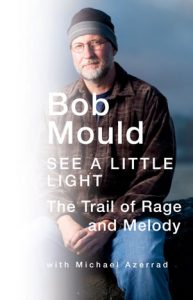Queer punk pioneer Bob Mould turned an abusive childhood into a musical movement, but memoir targets hardcore fans
2.5 out of 5 stars
SEE A LITTLE LIGHT: THE TRAIL OF RAGE AND MELODY
By Bob Mould (with Michael
Azerrad). 2001 (Little, Brown)
$25; 404 pp.
………………………….
It all starts with “Twinkle, Twinkle Little Star.” It continues with the itsy-bitsy spider, the ABCs and being a little teapot. From there, you embrace whatever your older siblings are listening to until you develop your own musical tastes. Maybe you started with records, moved on to the cassette tapes, CD and now, your iPod is full.
 The point is, you’ve never been without your tunes.
The point is, you’ve never been without your tunes.
But what about the people who make the music you love?
When Mould was born in 1960 in the northernmost end of New York, he entered a family wracked with grief: Just before he was born, Mould’s elder brother died of kidney cancer. He surmises that the timing of his birth resulted in his being a “golden child,” the family peacekeeper who sidestepped his father’s physical and psychological abuse.
“As a child,” he writes, “music was my escape.”
Mould’s father, surprisingly indulgent, bought his son guitars and young Bob taught himself to play chords and create songs. By the time he entered high school, Mould knew that he had to get out of New York and away from his family. He also knew he was gay, which would be a problem in his small hometown.
He applied for and entered college in Minnesota, where he started taking serious guitar lessons and drinking heavily. His frustrations led him to launch a punk rock band that made a notable impact on American indie music.
Named after a children’s game, Hüsker Dü performed nationally and internationally, but Mould muses that perhaps youth was against them. He seemed to have a love-hate relationship with his bandmates, and though he had become the band’s leader, there were resentments and accusations until the band finally split.
But there were other bands and there were other loves than music, as Mould grew and learned to channel the rage inside him and the anger that volcanoed from it.
“I spent two years rebuilding and reinventing myself,” writes Mould. “Now that I’ve integrated who I am and what I do, I finally feel whole.”
If you remember with fondness the ‘80s, with its angry lyrics and mosh pits, then you’ll love this book. For most readers, though, See a Little Light is going to be a struggle. Mould spends a lot of time on a litany of clubs, recording studios, and locales he played some 30 years ago — which is fine if you were a fellow musician or a rabid, hardcore fan. This part of the book goes on… and on… and on, relentlessness and relatively esoteric in nature.
Admittedly, Mould shines when writing about his personal life but even so, he’s strangely dismissive and abrupt with former loves, bandmates, and even family. I enjoyed the occasional private tale; unfortunately there were not enough.
Overall, See a Little Light is great for Mould fanboys and those were heavy into the punk scene. For most readers, though, this book is way out of tune.
— Terri Schlichenmeyer
This article appeared in the Dallas Voice print edition August 26, 2011.
















